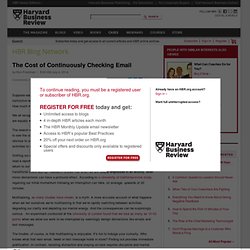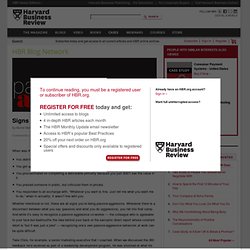

Create Slides People Will Remember. Your Boss’s Work-Life Balance Matters as Much as Your Own - Tony Schwartz, an... By Tony Schwartz and Christine Porath | 9:00 AM July 10, 2014 What leaders say is far less important than what they do.

That’s one of the clearest conclusions we drew from a study, in collaboration with HBR, of 19,000 employees around the world, focused on how they experience their lives at work. (You can still take the survey to see how your experience compares to other HBR readers’.) As we reported last week, companies seeking more sustainable high performance from their employees need to meet four of their core needs: renewal (physical); value (emotional), focus (mental) and meaning and purpose (spiritual).
When leaders actively support more sustainable ways of working in these four dimensions, the result is a significant positive impact on employees’ engagement, stress levels, retention, and job satisfaction. Unfortunately, only 25% of our survey respondents told us that their leaders model sustainable work practices. The same phenomenon applies to perks. The Cost of Continuously Checking Email - Ron Friedman.
By Ron Friedman | 8:00 AM July 4, 2014 Suppose each time you ran low on an item in your kitchen—olive oil, bananas, napkins—your instinctive response was to drop everything and race to the store.

How much time would you lose? How much money would you squander on gas? What would happen to your productivity? We all recognize the inefficiency of this approach. The reason we keep a shopping list and try to keep supermarket trips to a minimum is that it’s easy to see the cost of driving to the store every time we crave a bag of potato chips. Shifting our attention from one task to another, as we do when we’re monitoring email while trying to read a report or craft a presentation, disrupts our concentration and saps our focus. Multitasking, as many studies have shown, is a myth. Signs You're Being Passive-Aggressive - Muriel Maignan Wilkins. By Muriel Maignan Wilkins | 10:00 AM June 20, 2014 When was the last time you did any of the following at work?

You didn’t share your honest view on a topic, even when asked.You got upset with someone, but didn’t let them know why.You procrastinated on completing a deliverable primarily because you just didn’t see the value in it.You praised someone in public, but criticized them in private.You responded to an exchange with, “Whatever you want is fine. Choose the Right Words in an Argument - Amy Gallo. When addressing a conflict with a colleague, the words matter.

Sometimes, regardless of how good your intentions are, what you say can further upset your coworker and just make the issue worse. Other times you might say the exact thing that helps the person go from boiling mad to cool as a cucumber. So, when things start to heat up with a colleague — you don’t see eye-to-eye on a project or you aren’t happy with the way you were treated in a meeting, for example — how can you choose your words carefully? To help answer this question, I talked with Linda Hill, the Wallace Brett Donham Professor of Business Administration at Harvard Business School and faculty chair of the Leadership Initiative.
She is also the co-author of Collective Genius: The Art and Practice of Leading Innovation and Being the Boss: The 3 Imperatives for Becoming a Great Leader. Flextime Is Declining, But "Flex Around the Edges" Is Up - Sylvia Ann Hewlett. By Sylvia Ann Hewlett | 9:00 AM June 20, 2014 Earlier this year, San Francisco and Vermont passed legislation that allows workers to ask for flexible work schedules without fear of reprisal.

Are such “right to request” laws indicators of a rise in flextime? Or do they reflect a fear that flextime programs are being eliminated? The answer seems to be a confusing “both.” New research from the Families and Work Institute (FWI) and the Society for Human Resource Management finds an “on the one hand, on the other hand” contradiction. The good news is that some forms of flexibility — mostly allowing workers more control over when they start and end their workdays and more opportunities to telecommute — are on the rise. At the Center for Talent Innovation (CTI), we call this “flex around the edges.” Why Women Don’t Negotiate Their Job Offers - Hannah Riley Bowles. By Hannah Riley Bowles | 2:00 PM June 19, 2014 Research shows that women are more reticent than men to negotiate their salary offers.

For instance, one study of graduating MBA students found that half of the men had negotiated their job offers as compared to only one eighth of the women. This general pattern has been replicated in survey studies of working adults and in laboratory experiments. It begs the question: Why? Is this a “confidence” problem? Researchers have examined the why, and the answer has more to do with how women are treated when they negotiate than it has to do with their general confidence or skills at negotiation. In repeated studies, the social cost of negotiating for higher pay has been found to be greater for women than it is for men.